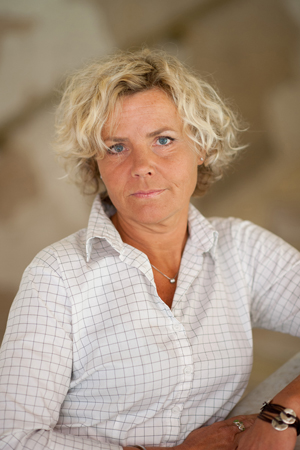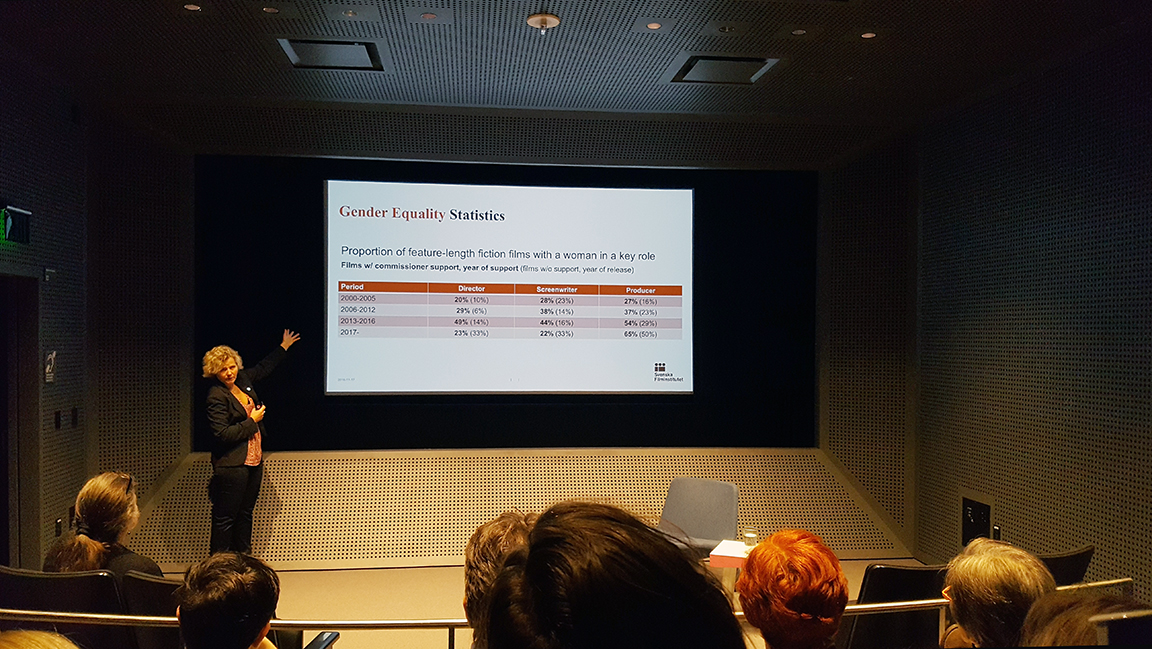Anna Serner teaches PFA about modern cinema
The CEO of the Swedish Film Institute is making way for '50/50 by 2020'
-
 Photo Name: Anna Serna, CEO, SFI PhotoID: 1-20180323_155217 (1).jpg Caption: “Anna Serner talked with UC faculty & students about gender equity in cinema at PFA.” Attribution: © 2018, Swedish Film Institute
Photo Name: Anna Serna, CEO, SFI PhotoID: 1-20180323_155217 (1).jpg Caption: “Anna Serner talked with UC faculty & students about gender equity in cinema at PFA.” Attribution: © 2018, Swedish Film Institute -
-
Earlier this year, distinguished CEO of the Swedish Film Institute, Anna Serner, led the celebrations for the Bergman100 centennial in the San Francisco Bay Area. The Institute is the funding arm of the nation’s film studio; Swedish Film Industry, the logo on most Bergman films, is the production house of the nation’s studio. It funds about 50 films per year.
Anna Serner has been CEO for a dozen years and initiated the famous 50/50 Project to assure gender equity, creativity and funding for the best Swedish filmmakers. Rather than guaranteeing absolute equality of funding to both men and women, this guarantees that women get an equal chance with men to be heard and assessed for funding. She requires top management in the industry to be enactors in this change management. Serner is proud of the program, for within three years Sweden achieved its goal, now producing more creative films and winning twice as many awards in international cinema competitions. -
 Anna Serner talked with UC faculty & students about gender equity in cinema at PFA. Photo: PFA (Berkley Art Museum Pacific FIlm Archive
Anna Serner talked with UC faculty & students about gender equity in cinema at PFA. Photo: PFA (Berkley Art Museum Pacific FIlm Archive -
-
The program has already proven itself and Serner is in great demand to teach other nations around the world to similarly assure equity for both sexes, proving creativity knows no bounds nor is limited by gender.
Serner is consequently now heading the “50/50 by 2020” project to achieve equity within two more years. The program has been adopted by Canada, Ireland, Africa and Eurimage (the European Union). The project gained momentum in the U.S. when she was here at the same time as the breaking off the Weinstein affair and the #MeToo movement.
By maintaining records nationally and internationally, reviewing them monthly, taking corrective actions and constantly generating awareness, Serner helps each participating nation achieve these goal: challenging everyone to reconsider what quality cinema is — it may be relevance and urgency of the story for today’s audience. Or perhaps it’s originality of a project. Do the production values of the craft show on the screen? So, in addition to 1) gender equality, she also looks to fund movies that are 2) of the highest quality, 3) original, 4) relevant, and 5) display the height of the craft of film. -
Bergman100
Anna Serner’s other big task this year is leading the Bergman100 world retrospective. At the institute in Sweden they are showing all 41 of his feature films, all now renewed in 35mm format. Elsewhere, attendance at screenings around the world are breaking records: more than 6,000 viewers in Rome and Vienna alone have attended showings so far this year. All the European countries are showing the retrospective as are Asia, South America, Canada and the U.S. www.ingmarbergman.se
The script and costume exhibit of “Fanny and Alexander” are currently featured at the Swedish Embassy’s Sweden House, in Washington, DC. Premiers and retrospectives are still being planned for theaters. Now we are seeing Bergman completely, whether chronologically, thematically, or stylistically. So, we can judge him not only by his peers but against contemporary film makers for his singular accomplishments as well as for his whole work. -
In discussing “Fanny and Alexander” at the Pacific Film Archive, Serner mentioned that so many of Bergman’s films contain autobiographical elements and themes. In the case of this film, she acknowledged that Bergman was not merely the director but the film also captures his humor and delight in life, two qualities greatly admired by his troupe of actors and cast. She noted that in this film, the role of Alexander was representative of his own elder brother, Dag.
She also related how Bergman’s older sister, Lena, now 73, had shown her and her daughter Ingmar’s home on Fårö. With them during that visit was a very well-known Swedish author and psychologist who is an expert on the distinctions between creativity and insanity. While viewing Ingmar’s personal library, the author found one of his own books, which was heavily marked, and in which Bergman had proudly proclaimed, “I’m not insane! I’m CREATIVE!” -
By Ted Olsson
-
-
